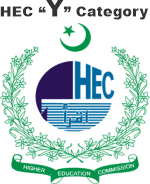PSYCHODYNAMICS IN TECHNOLOGICAL TRANSFORMATIONS AND POLITICAL ADMINISTRATION IN PAKISTAN: ISSUES AND CHALLENGES
Keywords:
Psychodynamics, Transformation, Artificial Intelligence (AI), Nanotechnology, Ministry of Information Technology.Abstract
The multifaceted influence of technology on Pakistani politics necessitates thoughtful consideration of its advantages and drawbacks. Effective integration of technology hinges upon striking a balance between upholding liberal ideals and embracing innovative solutions. This study contributes to a nuanced understanding of the evolving role of technology in shaping Pakistan's political landscape and underscores the importance of informed policymaking to harness its potential while mitigating its pitfalls. This research investigates the intricate relationship between technology and Pakistan's political culture, revealing positive and negative outcomes. The proliferation of social media, electronic interaction platforms, and diverse news outlets has fundamentally altered political dynamics, granting citizens unprecedented access to information and catalyzing digital activism. While these advancements have enhanced information dissemination, facilitated campaigning efforts, and increased transparency, they have also introduced challenges such as the dissemination of misinformation, digital inequality, digital gap and privacy concerns. The paper suggests that the integration of technology in governance, exemplified by initiatives such as the Election Commission of Pakistan's real-time broadcasting of election outcomes and lawmakers' participation in online parliamentary sessions, aims to bolster accountability and constitutional continuity. Furthermore, experiments with electronic voting machines and block chain technology in specific regions signify endeavors to refine voting processes and enhance economic transparency.
Downloads
References
Qadir, U. (2015). Political economy of technology acquisition in Pakistan: policy and constraints in the automotive industry (Doctoral dissertation, SOAS, University of London).
Shah, H. J., & Khan, A. (2023). Globalization and nation states–Challenges and opportunities for Pakistan. Social Sciences & Humanities Open, 8(1), 100621.
Ahmad, I., & Rafiq, A. (Eds.). (2016). Pakistan's democratic transition: Change and persistence. Taylor & Francis.
Ali, M., & Mujahid, N. (2015). Electronic government re-inventing governance: A case study of Pakistan. Electronic Government, 5(2).
Malik, Zain Ul Abiden, Huang Min Xing, Sundas Malik, Tayyab Shahzad, MinZheng, and Hani Fatima. "Cyber security situation in Pakistan: A critical analysis." Pakistan Journal of Archaeology of Egypt/Egyptology 19, no. 1 (2022): 23-32.
Yousaf, A., & Mahmood, K. (2020). To What Extent Pakistani Citizens are Enjoying the Right of Access to Information? An Exploratory Study.
Bazmi, S. (2022). Politico-Judicial Activism in Pakistan: A Historical Overview. Pakistan Journal of Social Research, 4(03), 97-104.
Sullivan, K. (2006). Relationship of E-Government to Public Administration Leadership. Halifax, Nova Scotia: Dalhousie University.
Yusuf, H., Dragomir, M., Thompson, M., Watts, G., Chan, Y. Y., & Nissen, C. S. (2013). Mapping digital media: Pakistan. Washington, DC and New York: Open Society Foundations.
Shad, M. R. (2019). Cyber threat landscape and readiness challenge of Pakistan. Strategic Studies, 39(1), 1-19.
Awan, J., & Memon, S. (2016). Threats of cyber security and challenges for Pakistan. In International Conference on Cyber Warfare and Security (p. 425). Academic Conferences International Limited.
Tariq, M., Aslam, B., Rashid, I., & Waqar, A. (2013, December). Cyber threats and incident response capability-a case study of Pakistan. In 2013 2nd National Conference on Information Assurance (NCIA) (pp. 15-20). IEEE.
Lall, M. (2014). Engaging the youth–citizenship and political participation in Pakistan. Commonwealth & Comparative Politics, 52(4), 535-562.
Gill, S. A., Aftab, R., Rehman, S. U., & Javaid, S. (2019). Youth empowerment and sustainable development: An Evidence from Pakistan’s Prime Minister’s Youth Program. Journal of Economic and Administrative Science.

Downloads
Published
Issue
Section
License
Copyright (c) 2024 PAKISTAN ISLAMICUS (An International Journal of Islamic & Social Sciences)

This work is licensed under a Creative Commons Attribution 4.0 International License.
This work is licensed under a Creative Commons Attribution 4.0 International License.
































